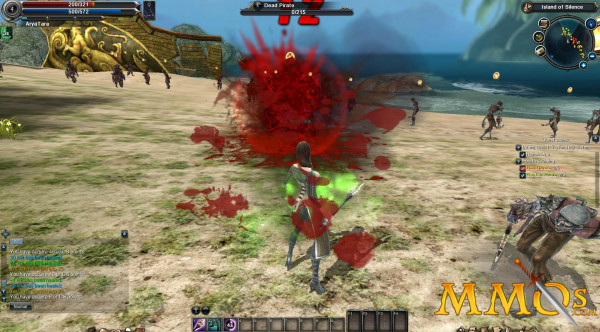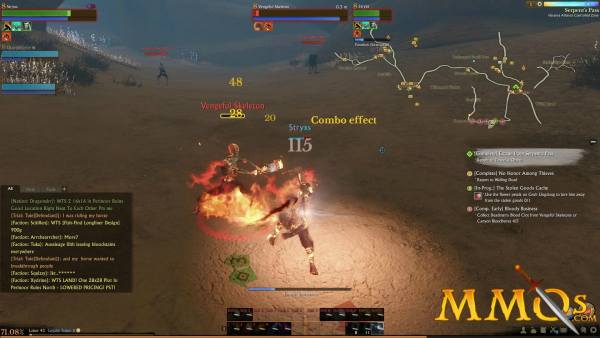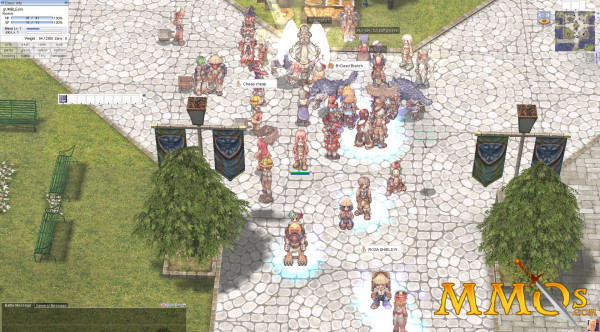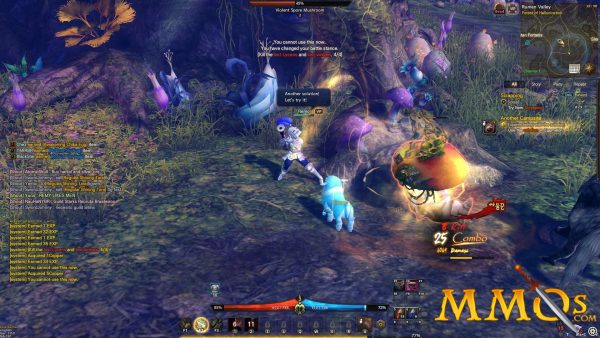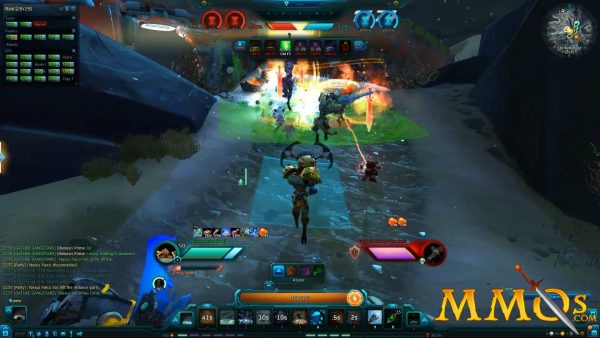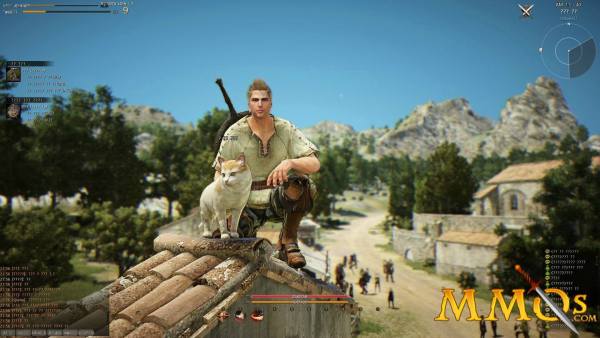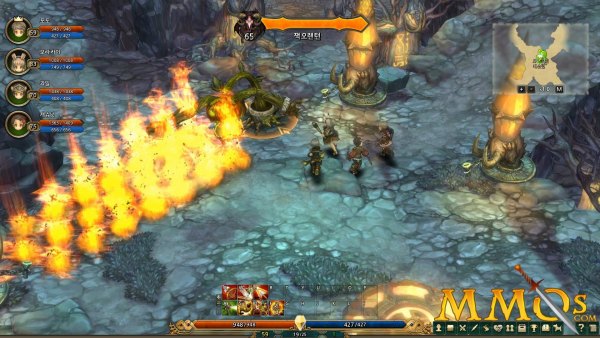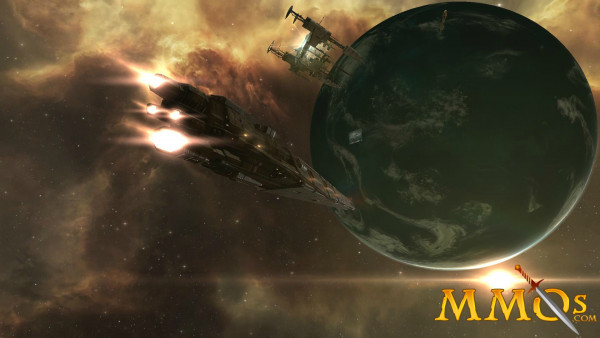The MMORPG Formula - A Brief Genre Analysis

Every time I read a comment proclaiming “the MMORPG genre is dead” I’m reminded of doomsday prophets proudly revealing some unspoken truth. But soothsayers don’t function in the present. And the market is far from dead—it’s booming. We are drowning in MMORPG’s and my swimmies are running out of air. But admittedly most titles fail to innovate, motivating commentators to proclaim the guillotine has sent MMORPG’s head rolling across the floor. The smell is repugnant but there is hope. MMORPG’s may eventually make it to paradise but first they must pass through purgatory.
The World Of Warcraft Formula
While World of Warcraft has influenced innumerable titles, some more than others—and it largely is the genre’s paradigm—it is not MMORPG’s Thanatos. Blizzard proved that the genre is big business. And companies followed in droves. WoW happened to release at the right time, when a generation raised on increasing computing power was coming of age (I didn’t have internet speeds capable of playing MMORPG’s until the dawn of WoW). Young players needed a world more familiar than EverQuest, Dark Age of Camelot, and Ultima Online. Blizzard geniusly built on an established franchise (Warcraft), transmogrifying the RTS craze into the MMORPG craze. They refined systems that already existed and delivered a polished experience.
But the deviations between MMORPG’s have always been slight. Viewed through the right lens every game looks the same; just ask your grandma. MMORPG’s build on the foundation of Meridian 59 and the legacies of Ultima Online and EverQuest. They embody general characteristics such as player economies, persistent worlds, progression, individuality (professions, specializations, or otherwise), and reliance on community to drive narrative interaction (bottom-up or top-down). At their core MMORPG’s are a way to participate in a virtual world and exert a measurable force on its direction (whether or not many achieve what they proclaim is debatable).
Blizzard created a checklist solidifying the aforementioned abstract qualities, delivering a tangible yardstick: hotkey-based skills, end-game raiding, level-based progression, and an emphasis on loot acquisition. As Fevir notes in an elegant rant, the criteria laid a framework for other developers to follow—a checklist of requirements. And many studios have been coasting along for the past 10 years by systematically regurgitating the formula. WoW is an established metric, and its systems’ cult following has crippled innovation, inevitably lending to the perception of the casualization of MMORPGs.
“Filthy Peasant Casualization”
Modern MMORPGs are unquestionably more accessible than their forefathers. After years of refinement systems have been streamlined to be intuitive and accessible to the widest possible audience. But developers are not solely responsible for the implementation of simpler game mechanisms. Players drove casualization, not developers. Players brought quest trackers, LFG group finders, and easy leveling to mainstream MMORPGs. Simplified systems weren’t introduced because a CFO pointed to an Excel graph. Players visited Curse for mods to pompously brag they were top DPS.
Simple game mechanics aren’t necessarily harmful (they can be an indicator of good design). Players with disposable income, i.e. the working class have to be able to participate—especially free to play titles. They support free to play titles as whales, considering a minority of players purchase the majority of cash-shop items.
Causal systems exist because of the instructions inherited from WoW’s success. Easier leveling is a byproduct of the vast majority of MMORPGs inherent emphasis on end-game raiding, which steadily increased as more players capped their level. While iridescent gear progression has been an orthodox staple since Dark Age of Camelot. An ecumenical harmony persuades development studios to develop MMORPGs-on-rails, as if everyone’s drinking from the same Jonestown punch bowl. Independently developed projects seem to revolt against the formula, but are too focused on nostalgia.
The Return Of Hardcore Games?
There are more hardcore MMORPGs now than ever before. While they don’t have $100 million budgets, they do have dedicated development teams who are passionate about creating the brutal experience fondly cherished in the nostalgia tinted recesses of memory; whether it be The Repopulation or perhaps Lord British’s upcoming Shroud of the Avatar (waiting on its qualification certificate). But their innovations are sparse. Hardcore titles sell themselves as successors, aiming to capture past glories like a crumbling empire.
No matter how closely they resemble their predecessors there is a void nearly impossible to fill. There never will be a glutted swarm surrounding hardcore titles; they cannot capture the expansive sense of community necessary for an immersive world. An oversaturated market filled to the brim with generic titles scatters the MMORPG community, preventing any one game from absorbing the majority’s attention.
Community
I’m convinced that a sense of community is paramount to creating an immersive MMORPG experience. Even stoic introverts have to feel their world is populated. But the sense of brotherhood has dissipated. I remember sitting in a basement with eleven PCs and each screen glared with Dota, World of Warcraft, Counter-Strike, and faces stuffing Costco pretzels down their throat. Now game communities dwindle after the first week of release. As Omer noted in MMO Hopping Is Incredibly Common, “Almost 20% of users who log in to a new MMO on launch will lose interest by the next day. About another 20% will lose interest in 3 days and by 30 days after their initial log in, only 20% of players will keep playing.” We hop from one fix to the next like addicts seeking new suppliers weekly.
Besides die-hard fans the community plays in a languorous haze until some false nimbus beckons them to another title. Criticisms littering chat logs are a cry for an indescribable novelty. Because the hype-train has crashed into a brick wall and only starving passengers buy another ticket. There are too many MMORPGs to choose from, each one a slightly altered doppleganger of its neighbor. Yet, I still find myself installing another client.
Oversaturated Market
Stepping away from a singular title to gaze at the MMORPG landscape reveals a crammed valley struggling to breathe. And every game is cawwing for attention, while new titles release and add to the cacophony. Tree of Savior, Blade & Soul, and Black Desert Online will be releasing in early 2016, while older titles suffocate and are forced to close down. The huge number of games makes it easy to outright dismiss any one for not being the arbitrarly envisioned Übermensch.
I don’t believe the market can sustain itself. The bubble will explode and the largest pieces of rubber will sustain themselves. Envisioning a future where developers must appeal to a global audience, I predict company’s will expand their development teams and focus solely on one project. Likely, the reason Western audience receive games from overseas years after release is due to required infrastructure—costing time, money, and people to release a game outside the home market. Overwhelming demand for Eastern games signals MMORPGs are not regionally isolated, but globally recognized. Moving forward companies will plan for shorter timeframes between region releases to optimize their return.
All Aboard The Hype Train
Nothing is more deadly to an MMORPG than unchecked hype. It’s a needle injected into eager eyeballs that ultimately leads to premature death. WildStar’s Open Beta was the most disappointing test-phase experience. I don’t hold the developers entirely responsible. The MMORPG community’s insatiable hunger to be captivated inflated the “WoW Killer” to ridiculous proportions. When I realized I was once again being fed the same generic formula I learned to ignore the parade celebrating an MMORPG before I had installed it.
“[MMORPGs] are like fireworks; after a burst of brilliance they fizzle and fade to smoke.” Nothing grasps attention because it’s the same spew sprinkled with jewels. Hype is used to sell a product you’ve already played. And players are Sisyphus rolling each new title uphill, only to watch it tumble down Hype-mountain and settle in Disappointment valley.
Monetization Worries
Rather than reanalyzing mechanics developers have been struggling to adapt their profit model to the current generation of disputatious players. It’s most evident through Black Desert Online’s schizophrenic monetization—a regionally exclusive payment plan. Staunch defenders of optimal monetization methods shout at each other across message boards, and studios struggle to please the Western market amidst proclamations of pay to win cash shops. But the war is dwindling and free to play titles dwarf buy to play.
While I unapologetically advocate new titles choose free to play, I only do so because there are too many clone alternatives to any buy to play game. It’s rare that a design feature differentiates itself enough to warrant a price tag, in a game that inevitably includes a cash shop. Without an established franchise dating back before the free to play revolution a new title cannot survive indefinitely. It’s why Black Desert will unlikely be buy to play in the West for more than a year. Moving forward games will be optimized to sell cash shop items without offending the general population.
Troll Criticism
There is a media responsibility to inform developers and publishers what is demanded from the genre. But a sense of complacency has lead to the clone-saturated MMORPG market and players are steeped like cold tea. Troll-ridden Steam reviews like “stuck in a wall, 10/10 -IGN, would recommend,” culminate in a generalized perception for unexamined game hunters. While publishing companies that exert influence on reviewers mislead the public like benighted pigs to slaughter. Critics are not journalists but endowed with honesty each soft voice becomes a shout. I’m tired of MMORPG’s ocean of mud.
The Genre Is Escaping The Quicksand
We are now entering a period where the formula no longer works. New games are cataloged in an ever-growing library, ultimately condemned to MMOs.com’s graveyard page. But bulk-labeling every new game blinds players to incremental innovations, sentencing the genre without trial. New titles present impressive refinements, such as Black Desert’s character customization and complex combat. Or WildStar’s fluidly optimized gameplay. Orthodox placeholders are steadily replaced by features possible through increased computing power and industry experience.
But only one title has deviated entirely from the WoW formula and survived—perhaps because it was born before World of Warcraft. Eve Online may not appeal to the masses but it stripped away expectations and continues to epitomize innovation. And that’s not a happy achievement. Spreadsheets-in-space released 12 year ago, yet no other studio has dared to create a similarly refreshing experience.
No MMORPG-god handed down commandments. The only rules are nebulous principles that must be sculpted by creative hands to exist. As long as Star Citizen doesn’t kill crowdfunding I’m hopeful that independent developers will challenge norms and question mechanics. Because MMORPGs developed primarily to generate profit ultimately fizzle. Passion should be the guiding principle, and—while an inference—I can’t imagine many industry developers spend their night giddily imagining a dream-project with borrowed elements coated in fresh paint. The MMORPG formula must dare to challenge orthodoxy if its ever to grow. Otherwise, it will stagger through purgatory until no one remembers it once lived.

